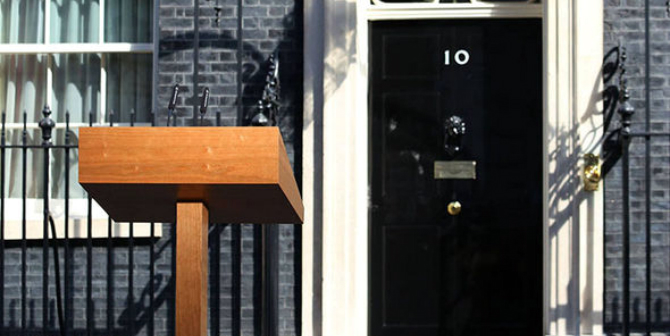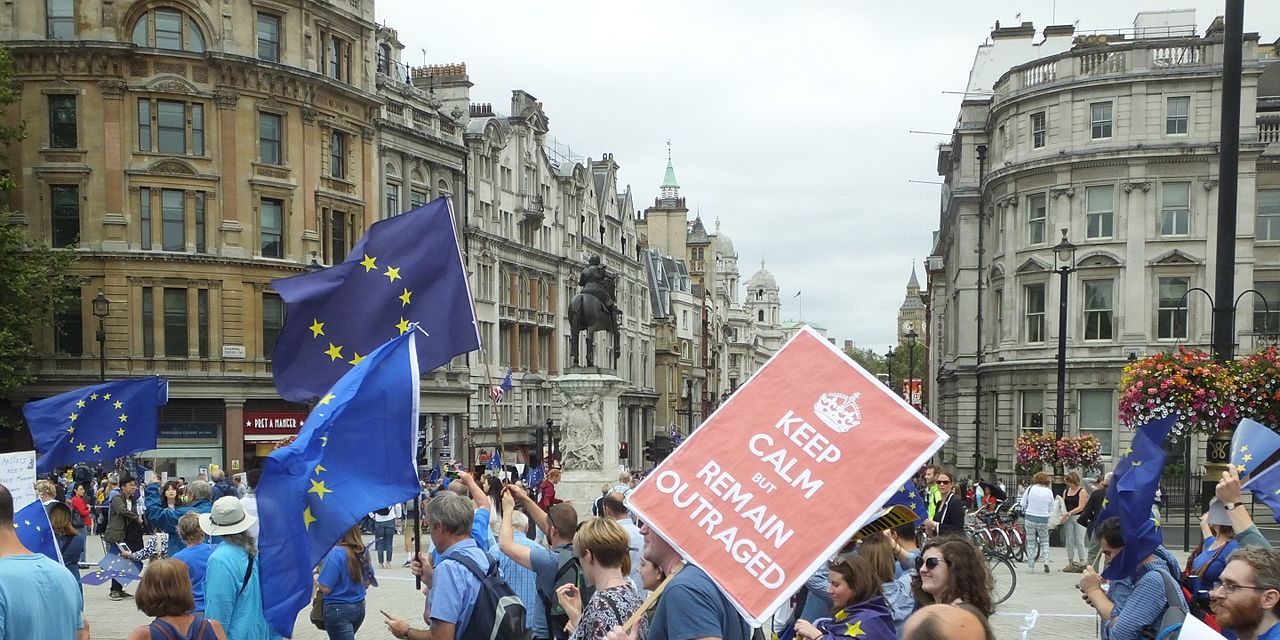 How would you choose Boris Johnson versus Jeremy Hunt? The July 9th live head-to-head debate on national television revealed the contrasting characters of the two candidates vying to become the leader of the UK’s ruling Conservative party, and hence, our next Prime Minister: optimism versus realism; big picture versus details; obfuscation versus precision; humour versus pointedness. Aside though from these stark contrasting personal styles, epitomised in the somewhat scruffy attire of Johnson and sharp-suited straight-tied Hunt, who will make the better Prime Minister? Deborah Rowland (Still Moving) explains the personalities behind the race to lead the UK.
How would you choose Boris Johnson versus Jeremy Hunt? The July 9th live head-to-head debate on national television revealed the contrasting characters of the two candidates vying to become the leader of the UK’s ruling Conservative party, and hence, our next Prime Minister: optimism versus realism; big picture versus details; obfuscation versus precision; humour versus pointedness. Aside though from these stark contrasting personal styles, epitomised in the somewhat scruffy attire of Johnson and sharp-suited straight-tied Hunt, who will make the better Prime Minister? Deborah Rowland (Still Moving) explains the personalities behind the race to lead the UK.
Content-wise, on major subjects such as Brexit strategy and budgetary spending plans, Boris Johnson versus Jeremy Hunt are not too far apart. It’s hard to choose between what they are proposing. My interest, in watching the 60’ of live combative exchange, was to focus on the how – I was rating them on their ability lead large complex change. For what skill can be more important than that for our next Prime Minister as the UK nation faces its biggest transformational challenge since post second world war Britain?
Just look at the chaos we are already in after that fateful referendum vote to Leave the UK three years ago. The so-called VUCA conditions of volatility, uncertainty, complexity and ambiguity are reverberating throughout my nation in glorious full-blown technicolour. In such conditions, the research I have led has shown that over half the reason why such unprecedented and disruptive contexts are well-navigated is down to eight core qualities of leadership. And, what’s more, both competence and character are needed in the success formula. In fact, how a leader “is”, the quality of their presence, their so-called inner game of character, is as, if not more important than what a leader “does”, the quality of their visible action. Movement starts in stillness. Please, whoever wins the race, I ask that you take heed of this vital skills combination. You owe it to our struggling nation.
So, let’s look at these eight leading change skills, and how I rated the two candidates for the UK’s next Prime Minister against them – given the evidence available. The first four skills are inner capacities, a quality of being. The second four skills are external practices, quality of doing.

Inner Capacities – Character – Quality of Being
Staying Present: which of the leaders displayed the better skill in noticing and paying attention to what was going on for them and around them, not getting distracted and remaining calm and OK with “what is”? For sure, this time Johnson was better able to remember the names of the people who were asking the questions compared to his previous poor showing in a live TV leadership debate, and, he converted with alacrity the disparaging jibe from Hunt about his over-optimism into a “the nation wants optimism!” retort – garnering applause. However, in my view, Hunt appeared the less ruffled candidate, paying close attention to his own emotional and mental state, sticking with the facts, continually referring to statements from the studio audience, and not letting his own issues “spill out”.
Curious & Intentional Responding: which of the leaders displayed the better skill in halting impulsive, default reactivity and being open-minded and resourceful to new routines? Johnson is notoriously unable to be considered and intentional in his response to stressful situations. On the night of the debate, neither candidate, to be honest, paid much attention to “hitting the pause button”, and the moderator, as skilled as she was, had to intervene strongly as the candidates continually talked over each other. At least Hunt attempted intentionality in the exchange, “let me get a word in please”, and alluded to the open-mindedness needed to approach the EU in the still-hoped-for Brexit negotiation, “if we go in with the wrong attitude…”. In my view, neither candidate seemed to step out of their habitual routines. We got the same old, same old….
Tuning into the System: which of the leaders displayed the better skill in seeing patterns and deeper trends, “reading the tea leaves” of the emotional climate among the nation? Against this capacity, Johnson won hands down. For sure, Hunt echoed back studio audience comments, but his attempts at intuitive, systemic perception appeared wooden. Johnson, on the other hand, has an innate capacity to tune into the zeitgeist of a situation, sense wider deeper trends, and not only that, voice it in ways that strongly resonate, “we are losing the trust of the electorate”, “people want us to focus on other issues”. He can see beyond detail into deeper reverberations beneath the facts. Great change leaders use these undercurrents as powerful levers.
Acknowledging the Whole: which of the leaders displayed the better skill in incorporating what is going to be difficult, not brushing disturbance and unrest aside, and able to give a respectful place to difference and polarity? I was saddened that at the end of the debate when asked neither candidate appeared able to name a positive leadership quality in their rival. Putting such ungraciousness aside, when rated against this integrating capacity, Hunt won hands down. Johnson appears to glide over difficulty with breath-taking ease, dismissing people’s despair as “negativity”. Hunt, on the other hand, avoids the cheery obfuscation and at-times outright dismissive attitude of Johnson towards people in disquiet and continually stated “we need to face up to things”.
External Practices – Competence – Quality of Doing
Attractor: which of the leaders displayed the better skill in articulating a clear, unifying and meaningful purpose, an aligning rallying call that can speak authentically to the day-to-day realities of people’s lives? This skill will be vital in healing the divisions of a deeply fractured nation. On the surface of it, the rhetoric of Johnson, “I’ll get Brexit done, we need a ‘can do’ spirit”, “I can unite” is very appealing to the weary. He came out with a “modern Conservatism” slogan, and a call for a “new partnership” with the EU. The crack in this picture though is the persistent cloud he creates around him of being a self-serving leader, only interested in “getting to number 10”. This is certainly not what this others-serving skill is about. Though sadly, Hunt didn’t fare too well either. He had his slogan, “we are the party for everyone” and made some attempt in his closing statement to portray his purpose as one of improving state schools, and social care – but he didn’t get my juices flowing.
Edge & Tension: which of the leaders displayed the better skill in confronting reality head-on, telling the truth about what is most difficult and hard to hear? Now, here is where Hunt came into his own in the debate. He had found a fire in his belly to get spikey, to call out Johnson’s repeating behaviour of not answering questions, to put him on the spot about his promise to deliver Brexit by October 31st – “deal or no deal”, “will you resign if you don’t get the deal Boris?”. He frequently mentioned “the reality is…”, said “there will be a cost to a no deal”, and “there would be a very serious tariff threat”. And he was firm in calling out the reactive behaviour of US President Trump in response to the UK Ambassador to America’s leaked email, saying that “allies need to treat each other with respect”. Hunt was by far the bolder leader in his ability to cleanly speak truth (and not worry about his own reputation in doing so).
Container: which of the leaders displayed the better skill in remaining non-anxious, calm and affirming, setting out clear plans and expectations, able to hold and channel the volatility of other people’s emotions – change’s inevitable companion? Again, I rated Hunt more able at this skill. He authentically made statements such as “I’ll only promise if we can do it…we mustn’t pretend”, “It’s our decision (the UK Ambassador’s fate)”, “I have actually delivered”, “I’m doing that because I want to”. I couldn’t find any evidence of Johnson’s containing ability, far from it, indeed, his sloppiness seems in need of that kind of leadership around him to keep his own energy channelled in the right direction – which the debate’s moderator had to most fiercely do with him, and not Hunt.
Transforming Space: which of the leaders displayed the better skill in being able to notice and disrupt patterns in the moment, living the change they wished to see? I now swing back to Johnson. Notwithstanding the fact that it was Hunt who called for the live TV debate in the first place, itself a transforming space opportunity, it was Johnson’s reported record that showed his skill in this area, “I get surprising results in difficult situations”. His reputation of “seizing the moment” and experimentally breaking with established routine is legendary. What is worrying, however, is that our research showed that when this skill is used in isolation from the other three external practices, then the leader appears as a self-serving Svengali – tapping into people’s craving to move to a better place but without altruistic intent, truth-telling, and firm expectation management. This can result in change leaders imploding.
In summary, against all eight of the needed skills to lead large change well, neither leadership contender came out well. For sure, I’d need more generalised evidence about the candidates than the character and competence they displayed within the conditions of a live TV head-to head debate. But, from all reports, this display was indeed typical of their leadership qualities. Whatever their political skill, their change leadership skill has much room for improvement.
I still can’t quite get my head around the make-up of the people in whose hands the fateful choice of our next nation’s leader now rests (the 160,000 conservative party members who are predominantly male, white, middle-class pensioners). But I hope they choose wisely. Who knows, given the VUCA state of the UK right now, our next Prime Minister might not rule for long. My sincere hope is that somehow, in some way, the collective leadership of Parliament will get its act together and be able to lead this nation through its mess. And that far greater attention to the quality of change leadership skill that transcends self-serving, polarised positions, will emerge.
This post represents the views of the author and neither those of the LSE Brexit blog nor of the LSE. Image C00 Public Domain.
Deborah Rowland created the Still Moving change consultancy, helping CEOs and their teams around the world implement change. She is also a member of the Archbishop’s Review Group into leadership development in the Church of England. In the 2017 Thinkers50 Radar, Deborah was named as one of the new generation of management thinkers changing the world of business. She is the co-author of Sustaining Change: Leadership That Works (Wiley, 2008), and now, Still Moving: How to Lead Mindful Change (Wiley, 2017). Deborah is a leading global thinker, speaker, writer, coach and practitioner in the field of leading large complex change.






